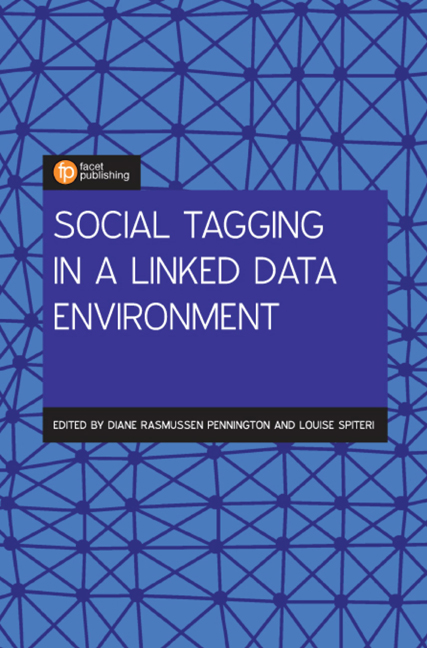Book contents
- Frontmatter
- Contents
- List of figures and tables
- Contributors
- 1 Introduction: the continuing evolution of social tagging
- 2 Tagging the semantic web: combining Web 2.0 and Web 3.0
- 3 Social tags for linked data with Resource Description Framework (RDF)
- 4 Social tagging and public policy
- 5 Hashtags and library discovery systems
- 6 Social information discoverability in Facebook groups: the need for linked data strategies
- 7 #FandomCommunication: how online fandom utilises tagging and folksonomy
- 8 Keys to their own voices: social tags for a dementia ontology as a human right
- 9 Social tagging and the enterprise: an analysis of social tagging in the workplace
- 10 Use and effectiveness of social tagging recommender systems
- Index
9 - Social tagging and the enterprise: an analysis of social tagging in the workplace
Published online by Cambridge University Press: 01 June 2019
- Frontmatter
- Contents
- List of figures and tables
- Contributors
- 1 Introduction: the continuing evolution of social tagging
- 2 Tagging the semantic web: combining Web 2.0 and Web 3.0
- 3 Social tags for linked data with Resource Description Framework (RDF)
- 4 Social tagging and public policy
- 5 Hashtags and library discovery systems
- 6 Social information discoverability in Facebook groups: the need for linked data strategies
- 7 #FandomCommunication: how online fandom utilises tagging and folksonomy
- 8 Keys to their own voices: social tags for a dementia ontology as a human right
- 9 Social tagging and the enterprise: an analysis of social tagging in the workplace
- 10 Use and effectiveness of social tagging recommender systems
- Index
Summary
Introduction
As this book looks at how social tags can serve to link content across a variety of environments, a key environment to address is the enterprise or workplace. As people of all generations are utilising social platforms and social tagging on a regular basis to share, search and retrieve information, the impacts of tagging behaviour in the workplace open new doors as well as create a bridge to how enterprises leverage behaviours displayed by their employees outside the workplace. Enterprise social media platforms have seen increasing use during the last few years. The popularity of Facebook and other social media platforms has caused businesses to ask the question: ‘Can a Facebook-like application be used to help our staff members work together?’ A 2011 survey conducted by British job site Reed.co.uk found that one-third of employees used social media while at work; and of those people who logged into social networks on a daily basis, 35% claimed that they did so solely for business purposes (Holtzblatt et al., 2013). Enterprises have implemented social business or collaboration platforms that provide employees with many of the same social features and capabilities, including wikis, blogs, tagging and the ability to create user profiles.
This chapter will examine tagging in the enterprise: specifically, the approaches, advantages, challenges and effects it has on employees. We will also look at how enterprise tagging plays a role in content management and in locating expertise within an enterprise and communities of practice. The main focus of this chapter will be on content tagging, people and collaborative tagging and communities of practice.
In this chapter the term enterprise is used to refer to an organization, company or business that provides services or products to the general public locally, nationally or internationally. As defined by Allam et al. (2010), enterprise tagging, or enterprise social tagging, is a tool that offers strong potential for organizations in knowledge sharing and collaboration. Tagging in the enterprise allows for many different opportunities, including document management, collaboration and identifying subject matter experts. The enterprise must provide its employees with the means to tag content (i.e. documents, records, videos and audio) and tag people (i.e. expertise within the enterprise) through collaboration or content management platforms.
- Type
- Chapter
- Information
- Social Tagging for Linking Data Across Environments , pp. 169 - 188Publisher: FacetPrint publication year: 2018
- 1
- Cited by



